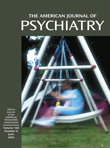Comparing Depression Treatments
To the Editor: The comparison by Nicola Casacalenda, M.D., et al. (1) of pharmacotherapy and psychotherapy for major depression included six studies. Only three had a placebo condition. Without a placebo comparison group, we cannot address the question of superiority of drug or psychotherapy because a finding of no difference may mean that neither treatment had a therapeutic effect. Although many drugs have shown greater antidepressant activity than placebo, that does not occur in all studies. Imipramine, perhaps the antidepressant most often compared to placebo, was shown in 31% of 36 trials as not superior to placebo (2). Indeed, one of the trials referred to by Dr. Casacalenda et al., a study by Elkin et al. (3), had as its main a priori hypothesis that neither imipramine nor psychotherapies would show an advantage over placebo.
If we examine the three studies that used a placebo, we get a different picture from the meta-analysis of the six studies. As mentioned, the study by Elkin et al. (3) showed no advantage for the drug or two psychotherapies, although a secondary analysis after stratification of the study group by severity indicated that imipramine and one type of psychotherapy showed an advantage over placebo.
Mynors-Wallis et al. (4) compared amitriptyline, problem-solving psychotherapy, and placebo and reported after 6 weeks of treatment—the most relevant duration since giving ineffective antidepressants for longer than 6 weeks is not usual practice—that amitriptyline was not superior to placebo but psychotherapy was. This study does not address the comparison of psychotherapy to drug treatment since the most relevant comparison (at 6 weeks) showed no drug effect for a well-proven drug treatment. It is not helpful to compare psychotherapy to drug treatment if that proven drug happens not to show efficacy in the study group.
A third study, by Jarrett et al. (5), compared phenelzine and cognitive therapy to placebo in subjects with atypical depression. Their main outcome measure was a repeated-measures analysis of covariance with scores on the Hamilton Depression Rating Scale. Although the main effects of time and treatment were significant, the most relevant measure—the interaction between treatment and time—was not. Nevertheless, pairwise comparisons showed significant differences most weeks between each active treatment and placebo and no difference between the active treatments.
Dr. Casacalenda et al. (1)used as their measure of remission a final score of 7 or lower on the Hamilton depression scale. Jarrett et al. (5) used a threshold of 6 or lower on the Hamilton depression scale. The overall chi-square values for remission with the three treatments (phenelzine, psychotherapy, and placebo) were significant; the pairwise comparison of phenelzine and psychotherapy was not. This led the authors to conclude that the treatments were effective and equivalent. Yet, the risk ratio of cognitive psychotherapy and phenelzine was 1.1, with a 95% confidence interval of 0.7 to 1.9. This indicated a wide spread and a substantial lack of precision, leading, I believe, to reasonable doubt about the equivalence of the treatments.
I conclude that none of these studies supports the contention that drug therapy and psychotherapy are equivalent in the treatment of major depression, and a meta-analysis of studies that includes those without a placebo cannot answer the question.
1. Casacalenda N, Perry JC, Looper K: Remission in major depressive disorder: a comparison of pharmacotherapy, psychotherapy, and control conditions. Am J Psychiatry 2002; 159:1354-1360Link, Google Scholar
2. Klein DF, Davis JM: Diagnosis and Drug Treatment of Psychiatric Disorders. Baltimore, Williams & Wilkins, 1969, p 193Google Scholar
3. Elkin I, Shea MT, Watkins JT, Imber SD, Sotsky SM, Collins JF, Glass DR, Pilkonis PA, Leber WR, Docherty JP, Fiester SJ, Parloff MB: National Institute of Mental Health Treatment of Depression Collaborative Research Program: general effectiveness of treatments. Arch Gen Psychiatry 1989; 46:971-982; discussion, 983Crossref, Medline, Google Scholar
4. Mynors-Wallis LM, Gath DH, Lloyd-Thomas AR, Tomlinson D: Randomised controlled trial comparing problem solving treatment with amitriptyline and placebo for major depression in primary care. Br Med J 1995; 310:441-445Crossref, Medline, Google Scholar
5. Jarrett RB, Schaffer M, McIntire D, Witt-Browder A, Kraft D, Risser RC: Treatment of atypical depression with cognitive therapy or phenelzine: a double-blind, placebo-controlled trial. Arch Gen Psychiatry 1999; 56:431-437Crossref, Medline, Google Scholar



